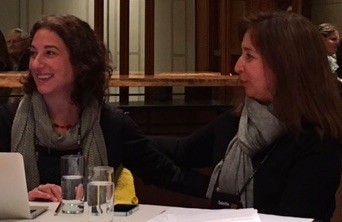- Home
- About Us
- The Team / Contact Us
- Books and Resources
- Privacy Policy
- Nonprofit Employer of Choice Award

 Marie Wilson, one of the Commissioners of the Truth and Reconciliation Commission, has often reminded us that reconciliation must include all peoples on this land, “it is a process in between and within Aboriginal families, churches, governments and all Canadians”. Increasingly Canadians are understanding that they have a role to play in creating a new relationship. In fact, 82% of Canadians feel they have a personal role to play in reconciliation process (The Environics Institute). This is heartening, and an essential step in creating a new relationship between Indigenous peoples and other Canadians living in this land. In fact, there are many indicators that we are at a particular moment in time where, after six generations, this is possible.
Marie Wilson, one of the Commissioners of the Truth and Reconciliation Commission, has often reminded us that reconciliation must include all peoples on this land, “it is a process in between and within Aboriginal families, churches, governments and all Canadians”. Increasingly Canadians are understanding that they have a role to play in creating a new relationship. In fact, 82% of Canadians feel they have a personal role to play in reconciliation process (The Environics Institute). This is heartening, and an essential step in creating a new relationship between Indigenous peoples and other Canadians living in this land. In fact, there are many indicators that we are at a particular moment in time where, after six generations, this is possible.
For the charitable sector this new relationship is essential. Charities, be they granting giving foundations, or operating charities, have a responsibility to achieve a positive impact, it is their purpose for being. Whether in health or education, culture or youth, poverty reduction, environment or employment, none of these charitable goals can be fully realized unless we work towards reconciliation. Despite this, 2013 charities that delivered programs focused on First Nation, Métis and Inuit (FN/M/I) issues and peoples represented 1% of the 85,000 charities in Canada.
The challenge often faced by the charitable sector engaging in reconciliation is not about relevance or desire, but practical understanding of how. Many charities tell us they don’t know where to start or don’t feel they know enough, the complexity of the issues can seem overwhelming, there are administrative barriers, they don’t want to make a mistake.
It was with this challenge that a number of philanthropic leaders came together to create The Philanthropic Community’s Declaration of Action. To date over 80 philanthropic organizations have signed the declaration each of them pledging in their own way to move their organizations forward towards reconciliation. Although directed at the philanthropic sector the Declaration provides a framework that all organizations and individuals can apply to their work. Each organization will have its own path, but here are some initial steps to consider:
Listen and Learn
You can start small but do something. Even if you spend an hour a week learning about the history of the territory you are on or areas your organizations serves. Read the calls to action as outlined by the Truth and Reconciliation Commission, listen to a podcast, follow Indigenous writers on twitter, go see a film, read a book or watch a play from an Indigenous author. Organizationally you can create a learning plan, invite an Indigenous educator in to share with you reconciliation “101”. It is crucial that we all know the truth about Canada’s history with Indigenous peoples.
Understand and acknowledge
Once you begin the path to know the true history it becomes easier to understand the legacy of harm and intergenerational trauma that residential school system and other governmental policies purposefully created to extinguish Indigenous peoples, their culture and livelihood. It also provides a context for the need for a multi-generational approach to healing.
Participate and Act
This may look different for every individual and organization. There are a few starting points for how to embed reconciliation into your work and life. Starting with the knowledge you are important on this path you can look at your personal relationships, who are they with? Organizationally, review your programs and services, ask for guidance to ensure they are adequately supporting what Indigenous communities are working on. Look inward at your governance structure and staffing, are you benefiting from the perspectives and knowledge of Indigenous peoples in your leadership?
We are inspired everyday by the incredible work of the individuals and organizations that make up Canada’s charitable sector and excited to see them working together to respond to what is the urgent challenge of our time.
“It falls on all people living in Canada to continue the hard work of healing and reconciliation, each in our own way and where possible, together, in our families and communities, in the organizations we work with and belong to, and as a nation. This is an important calling to which all of us are duty bound to respond.” Excerpt, The Declaration of Action
Prompt your organization to become a signatory of The Declaration of Action as you activate your role in reconciliation.
Learn more about The Philanthropic Community’s Declaration of Action at: http://www.philanthropyandaboriginalpeoples.ca/declaration/
Andrea Nemtin is President and CEO, Inspirit Foundation and a Board member of The Circle on Philanthropy and Aboriginal Peoples in Canada
Wanda Brascoupé Peters is the Executive Director, The Circle on Philanthropy and Aboriginal Peoples in Canada